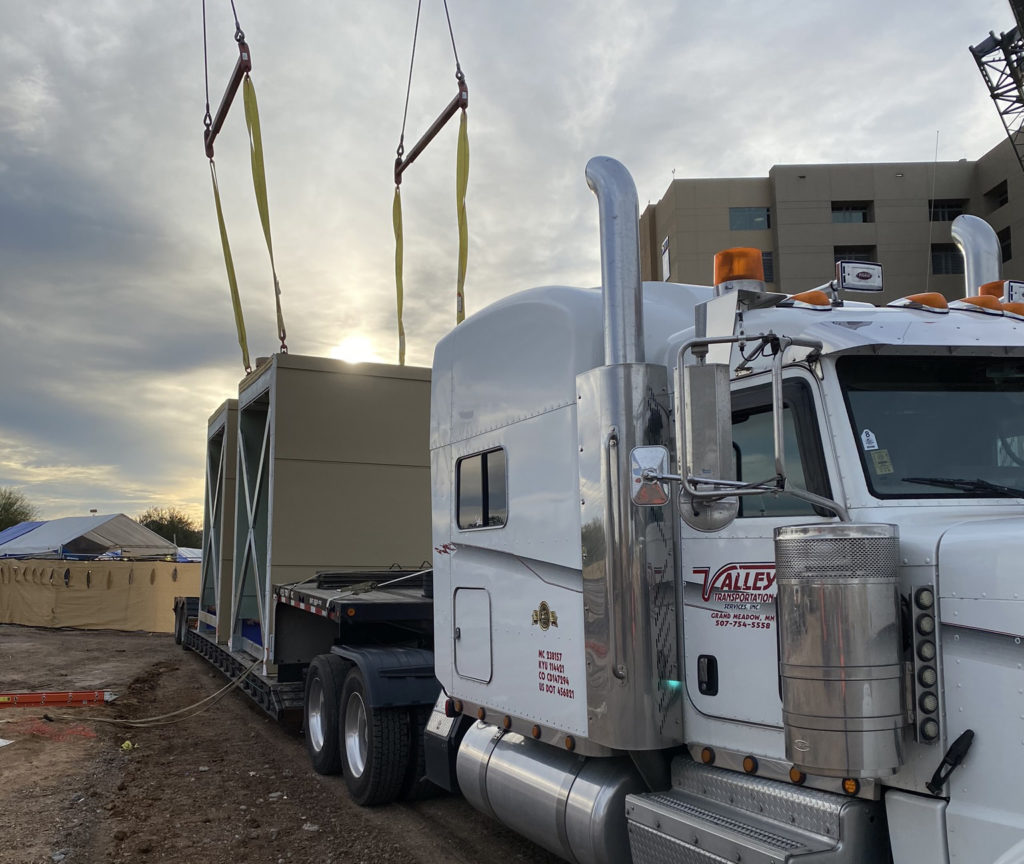
 | Stream Logistics | June 7, 2021 |
Share this Article     | Transporting High Stakes Freight requires some important logistical considerations, including proper permitting to legally enter or pass state lines. Construction projects are built around timelines and schedules, and finding out that your freight isn’t properly permitted the hard way can have a disruptive domino effect that is costly and damaging to your reputation. In this post, you will learn the basics about oversized, over-dimensional, wide, and heavy haul trucking permits and when they’re required. To figure out what you’ll need for your specific freight, be sure to check out the free shipping tool that we link at the end of this post. What are trucking permits? Trucking permits authorize the movement of oversized, over-dimensional, wide, and heavy haul trucks and freight. Modular and prefabricated products commonly fit within this category of freight. When it comes to the logistics management of High Stakes Freight, it’s critical to have all the proper trucking permits before transiting to avoid costly delays. State trucking permits vary, which we’ll explain more in detail later in this post. Some state permits provide details and instructions about hours of operation and routes allowed, so the permit is only valid when those legal restrictions are followed. When High Stakes Freight is moved across state lines, it’s critical to consider each state’s rules and permitting to follow state guidelines and stay on schedule so construction isn’t interrupted or delayed. What types of trucking permits are available?There are a variety of permits available. They vary based on state, type of trip, and frequency. For example, a permit can be good for a single, one-way trip or repetitive trips over a certain length of time. Annual permits can also be obtained in some states for certain load types or specific vehicles on specified highways. Single-Trip PermitsTo legally travel to or through certain states, foreign-based interstate carriers must purchase the appropriate permits. Single-trip permits expire after a few days or upon exiting the state, whichever occurs first, and the fee amount may be based on the distance traveled through the state. Envelope PermitsEnvelope permits are issued for a nonspecific and non-reducible vehicle or cargo load that does not exceed certain size and weight specifications. Registration and business location restrictions may apply. Registration or Use Fuel PermitsInstead of single-trip permits, registration and/or use fuel permits can be purchased in some states to enter and travel lawfully on multiple trips over a specific time period. The fee is based on a few different factors including the permitted length, and it requires current registration from another state, jurisdiction, or country. Registration or use fuel permits restrict the vehicle and the load to whatever was declared but are useful where the same permitted freight will be moving consistently over a length of time. Oversize/Overweight PermitsClass A oversize/overweight permits are issued for nonreducible vehicle and load combinations within specific size and weight limits. Typically they are issued as a single-day permit or for a specific length of time for travel on state routes, meaning permits for use of other than state routes must be procured from the proper local authority and they cannot be used to routinely transport legal loads on over-width trailers. Interstate RegistrationInterstate (or Nonresident) Registration, can be issued to an owner/operator of a commercially operated motor vehicle if they are registered elsewhere and conducting interstate operations. This could be a solution if they do not qualify or wish not to register under the International Registration Plan (IRP). Why and when are trucking permits required?Trucking permits ensure statutory requirements are met to commercially operate motor vehicles safely on public roads and highways. They are used to collect taxes for fuel and miles operated over the highways of the US. Each state has a different tax rate on the fuel purchased and miles driven. Whenever a truck, trailer, or freight exceeds certain legal thresholds on length, width, height, or weight, a permit is likely required to enter or pass through each state. To see permit requirements by state, check out the table below:
If you’d like to learn more about how Stream Logistics can help you with your next project, reach out! |
| Have questions about carrying your load or freight? Our expert logistics team will gladly help with a free 15 minute consultation. | Get Expert Advice |